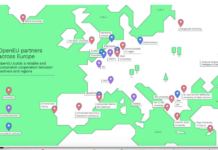
The European Links-up Project interviewed five experts on Learning 2.0 at the recent EDEN Annual Conference in Dublin. The experts were asked three questions:
1. Is learning 2.0 really supporting inclusive life-long learning?
2. Can isolated experiments be mainstreamed?
3. Is learning 2.0 fundamentally changing the educational landscape?
The following attempted to answer these questions in about five minutes each (click on their names to see the videos):
Graham Attwell, Director of Pontydysgu and Associate Professor, University of Warwick and University of Bremen
Steve Wheeler, Associate Professor, University of Plymouth
Ingebør Boe, Board Member, International Council for Open and Distance Education
Roni Aviram, Chair of the Center for Futurism in Education at Ben-Gurion University
Maruja Guttierez -Diaz, Advisor to the Director, Education and Culture, European Commission.
Links-up is a European Commission research project about how Web 2.0 is changing the face of education and training for disadvantaged people. It puts together a picture of the ‘landscape’ of ‘Learning 2.0 for Inclusion’ by reviewing what has been done in the academic and research field, and by practitioners working on the ground using Web 2.0 to work with disadvantaged groups.
Comment
Although I enjoyed the interviews, I have a question: what is the connection between Learning 2.0 and the disadvantaged? I don’t have a problem with the European Commission trying to do a bit of social engineering to see if new web 2.0 tools will help the unemployed and other disadvantaged groups, but aren’t there other factors, such as social inequity, poverty, economic stagnation, and other larger forces that will largely outweigh the impact of technology, however well designed and well meaning the projects? None of the speakers addressed this.
Don’t misunderstand me – I think learner-centered teaching and web 2.0 tools fit like a glove on a hand, and are the best thing since sliced bread in education – but don’t load up expectations that they are the answer to all the world’s problems, unless they are used for social revolution in the way they have been used in the Arab Spring. But I don’t think that’s what the European Commission had in mind when it funded this project.
This is no criticism of the speakers who did a valiant job answering big questions in a short time.









 Dr. Tony Bates is the author of eleven books in the field of online learning and distance education. He has provided consulting services specializing in training in the planning and management of online learning and distance education, working with over 40 organizations in 25 countries. Tony is a Research Associate with Contact North | Contact Nord, Ontario’s Distance Education & Training Network.
Dr. Tony Bates is the author of eleven books in the field of online learning and distance education. He has provided consulting services specializing in training in the planning and management of online learning and distance education, working with over 40 organizations in 25 countries. Tony is a Research Associate with Contact North | Contact Nord, Ontario’s Distance Education & Training Network.


[…] Source: Tonybates.ca […]